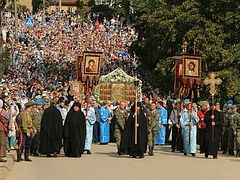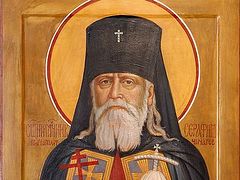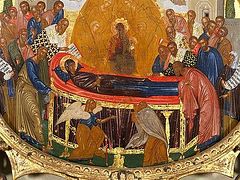Behold thy mother (Jn. 19:27)
A homily in New Neamț Monastery in Moldova on the day of the celebration of the Dormition of the Mother of God
The spiritual power and universal glory of the Mother of God was revealed to people only by her Dormition. Her entire life was filled with the greatest of trials, sorrows, humiliations, suspicions from her neighbors, and even secret, hidden podvigs from her childhood. Silent among the noisy world, she meekly and humbly watched the Gospel events from the crowd of people that accompanied Christ, and laid up everything in her heart. Like a mystical moon, she shone softly and from afar, taking her Divine light from the Son of God, as the Eternal Sun, drawing everyone to prayer and to contemplation of the greatness of the Savior of the world and the boundless love of the Benefactor of mankind, only occasionally hidden in the rays of His Heavenly glory.
The day of her Golgothic sufferings cannot be revived in our memory without a shudder of the heart. Seized by fear and completely exhausted from her own mental anguish, she stood before her crucified, tormented, tortured, and dying Son. Could there be in her long-suffering heart, silently enclosing all the mysteries of God, the slightest notion of such a fate, foreordained for her Divine Son, or the feeling of this greatest horror aroused in her unwitting doubts in the human mind, using these terrible hours of unbearable trials for the grace-filled righteous one and humble servant of the Lord? Finally, the Divine Sufferer, avoiding His gaze meeting that of His poor, fervently loving Mother, deeply shaken by the Golgotha spectacle, turned His bloodied face to her, seeing His beloved disciple with her, who hadn’t abandoned the Mother of God, pronounced with an affectionate and filial voice, quiet from suffering: Woman behold they son!... Behold thy mother!
How precious these words are for all of us: Behold thy mother! How close they are to the heart, how understandable, and how comforting for all believers, all the grieving, suffering, the lonely, who tenderly love the Mother of God, in need of her holy and pure love, of her intercessions before Christ her Son, of her patronage, help, and support. Behold our Mother! Can anyone’s love replace the pure and holy love of a mother? There is no age when someone is not in need of maternal affection, sympathy, support, help, and teaching. Therefore our Lord Jesus Christ, knowing human feebleness, the needs of our hearts, and innumerable sorrows, adopted His followers in the person of His beloved disciple John to His Most Blessed Mother, the Queen of Heaven and Earth, exalted above the Cherubim and Seraphim, the all-powerful patroness and intercessor, the Surety of Sinners, the glorious one Who is Quick to Hear, the Joy of All Who Sorrow, the most loving of all earthly mothers. In this was once again expressed the boundless love of God for mankind. Blessed be the name of the Lord forevermore!
Who doesn’t know how cheerless and difficult is the life of orphans! All sorts of shelters, schools, and educational institutions are filled with them, but there are still many orphans who are more unfortunate, wandering the streets of the cities and villages, feeding themselves with alms, shivering from hunger and the cold, ashamed of their poverty and nakedness, with indifferent, dull eyes, with bitter feelings in their hearts that have lost hope in the sympathy of the well-fed and happy, in the possibility of moving to pity those whom they meet among the multitudes of people who are busy with their own affairs and cares, and fearing every meeting. They are all children of God like us! But no alms, no sympathy, no care from benefactors can ignite their sorrowing hearts and warm their souls like the affection of a mother. Many orphans are not only on the porches of our churches, but among those praying at the services. You can see them when they are praying in their favorite corner of the church before the icon of the Mother of God. Drawn to the tender and dear face of the Mother of God, they lovingly prattle off their requests and thoughts, and simply lay out their sorrows and needs to Our Lady. She, the most blessed, fulfills everything: When orphans ask forgiveness, she forgives; when they beg for help, she immediately and miraculously helps; even if they are soliciting childish pleasures and indulgences for themselves, she never refuses.
This is the only place where the heart of an orphan is warmed by mystical tenderness and joy: Behold his mother!
Family life in our times is frustrated, corrupted, and often disintegrates. Today’s youth have few family joys, and therefore they do not have sincere love and affection for their parents. Gone is that love that prevented people from doing anything in their lives that they couldn’t tell their mother about, that affection that wouldn’t allow them to live, to work, to solve any matters or questions without their mothers’ blessing. How many parents there are today who avoid and do not want to approach the inner life of their children, who are passionate about secular interests or arts, business, service, and social and state issues! They have no knowledge in matters of upbringing, because they are far from understanding Christianity and the purposes of human life. Others express their love for their children by completely submitting to their will. Undoubtedly, today’s young people are often alone in their families and therefore they seek sympathy, affection, love, guidance, and satisfaction of their spiritual and heartfelt needs outside of the home. Terrible is this world, lying entirely in evil and in the battle with truth and piety! The salvation of those who are perishing is possible only in their adoption by the Most Blessed and Most Glorious Mother of God. The believing heart perceives how often the Mother of God supports and helps these youths and children by her intercession, protection, and teaching. Behold their Mother!
And there are many good, caring, and loving mothers who are no less helpless in life, for various reasons. There is no limit to their worries, tears, and anxiety about their children. A mother’s true torments begin the day her children start school: She fears the influence of other students, new acquaintances, the modern direction of science, teachers and educators, the spirit of the times, disbelief, and godlessness. The older children become, the more worries, fears, and cares are multiplied and increase, as fear of her own passions and character flaws sets in. In adolescence, these fears turn into grief and despair, requiring the persistent resolution of fearful questions: how to protect, how to preserve, how to safeguard, how to save them?! Many mothers realize and remember that their children are first of all children of God, that they are not only obliged, but also able to give them knowledge of the faith, to instill sincere faith in them by their own example, to inculcate the fear of God, and to lead them to Christ, and then, when young people find independence and freedom, there is no other salvation than to wholly give them over to the care of the Mother of God. It remains for parents to protect their children with fervent prayer, by which they themselves find confidence and peace. Famous are the words of the prayer to the Mother of God: “For we have none other help, none other hope but Thee, O Lady!” These are not just words, but an eternal truth!
With a broken family, moral people come to a point of bitterness and despair. The future of their entire lives, with all the joys and feelings to which the soul aspired as to sacred objects from the first year of its conscious existence, seems irretrievably lost and hopeless. They recognize themselves as eternally unhappy in those hours of life that we all experience when the loving heart, sympathy, participation, and care of a mother—everything they had in their parent’s home—is especially lacking. It is felt not only in youth, but even more clearly and more sincerely in adulthood. But where, from whom is there to seek affection and sympathy now? Only the Mother of God, the Joy of All Who Sorrow, who has passed through so many human trials and woes, can comfort by her holiness, her pure love, and strengthen in the podvigs before us. Human sympathy is mainly just words.
Life in monasteries seems quiet, solitary, peaceful, joyful. Hidden from human eyes, these humble habitations, often surrounded by high walls, are inhabited by special people who have renounced the world and pernicious self-will. There, everyone, from the youngest to eldest, are called to the asceticism of sorrows, unbearable trials, spiritual illnesses, human malice and enmity of relatives, and only in rare cases of special signs and suggestions of the Christ the Lord Himself. Here everyone is lonely, orphaned, deprived of the involvement and affection of relatives, the sympathy of friends; everyone is in sorrows, prayers, and tears, in persecution from the world that maligns, condemns, and curses, and from the enemy of our salvation, who torments with angry slander and innocent sufferings; here there are also those who are still young and troubled, in days of temptations dreaming about the past, about the sweetness of freedom and family joys; and there are the grumbling elderly, enduring every bodily ailment and disease and treating themselves with ceaseless prayer.
Amidst this seemingly quiet and peaceful life, how many there are who suffer in soul, who are tormented in their hearts, who have lost their composure, who are defeated in the battle with the spirits of evil and are afflicted with passions! This seclusion, these stone walls do not ease the soul and do not bring calmness. In monasteries, as everywhere, there are people, concerned with their own affairs, obligations, and interests, suffering, grieving, and tempted, who go to their confessors or Godparents, or to more experienced elders and ask them questions. And they always receive one and the same wise answer at the end of the conversation: “Endure; without sorrow you cannot be saved. You came to the monastery to endure!” Only in his cell does a sorrowing monk find affection, sympathy, and a truly soul-profiting response, when he rests his prayerful gaze on the Divine face of the Mother of God, illumined by a glimmering lampada.
He sees the kind, tender look of the Most Holy Virgin, the smile on her lips, and her maternal love for Christ the Savior… He as if hears the Infant Christ speaking: Behold thy Mother!... Behold the handmaid of the Lord! In an instant he recalls the orphanhood of the Mother of God, her podvigs in the Temple, her eternal tribulation and persecution, her endless trials, and is conscious that only she, who is the Most Pure and Most Blessed, can understand every human sorrow, listen without condemnation, sincerely sympathize, and truly help! In this holy, blessed moment, she becomes more precious than the entire world, as the sole hope and joy. A sorrowful heart is unexpectedly and mystically warmed by her holy love, and in it again flickers the fire of Divine truth, filling the entire essence of the ascetic who is powerless in the struggle with innermost joy.
The history of Russia is full of national sorrows and diseases. Who just from among its neighboring peoples has not tried to conquer its territory and force it to change its Orthodox faith, which the Russian people received unwaveringly together with the Mother of God and the Son born of her, as the breath of life, with firm awareness that Orthodoxy is the one, true, universal faith and its Church—the sole Church of Christ? All of these attempts were met with not just an amicable, but a miraculous rebuff from the Russian people, protected and glorified by the Mother of God and her innumerable miraculous icons that existed in all cities, villages, and monasteries of vast Russia, for the preservation of its true faith.
In the allowance for every depraved, weak-willed, and spiritually undeveloped man to switch from his faith to another, even non-Christian belief, the Russian people, strong in spirit and mind, will always see the denigration of the Orthodox faith, the insulting of the truth of Christ, the fall of enlightened leaders into the abyss of ungodliness, to the time of the triumph of paganism, when it wasn’t yet decided who and how man should worship, where was the truth, what was the purpose of human life, where is man’s conscience. This can only be taken as blasphemy against the Holy Spirit and the most intolerable betrayal of the Motherland to corruption and devastation.
Listen, my beloveds, to this fearful national roar, reaching to you from all ends of great Russia, which looks in horror at the total depravity of the young generation by the spirit of the times, created by Russia’s sworn enemies, and at the freedom of religion brought by the new teachings and fashions of modern non-Orthodox thinkers in imitation of some Western states—such freedom which, in the expression of the holy apostle Peter, is a cloak of maliciousness (1 Pt. 2:16).
But the Russian people are still strong in the intercession of the Most Blessed Mother of God. Truly she is and ever will be our Mother, of all those faithful to the Lord, all those who sorrow, who are offended, and who are persecuted.
God so loved His Church that He gave us all His Mother, the Theotokos. Let us ceaselessly call upon her to help the Russian Orthodox Church and ask her to sanctify our land with her holy feet and to disperse our enemies by the holy breath of her mouth!
Blessed be the name of the Most Blessed Mother of God forevermore! Amen!




